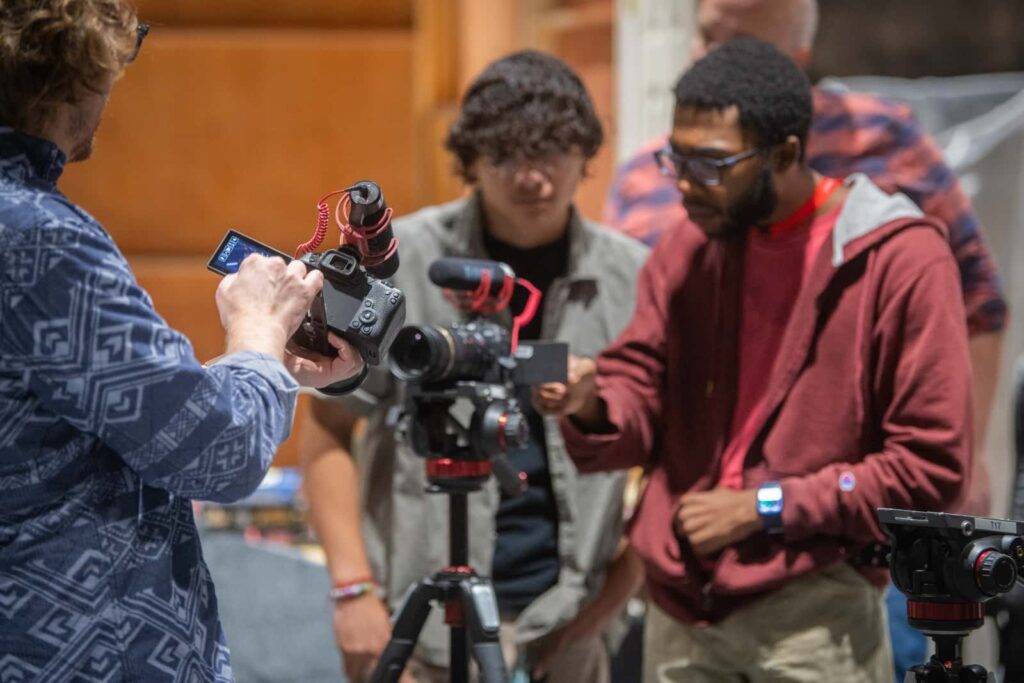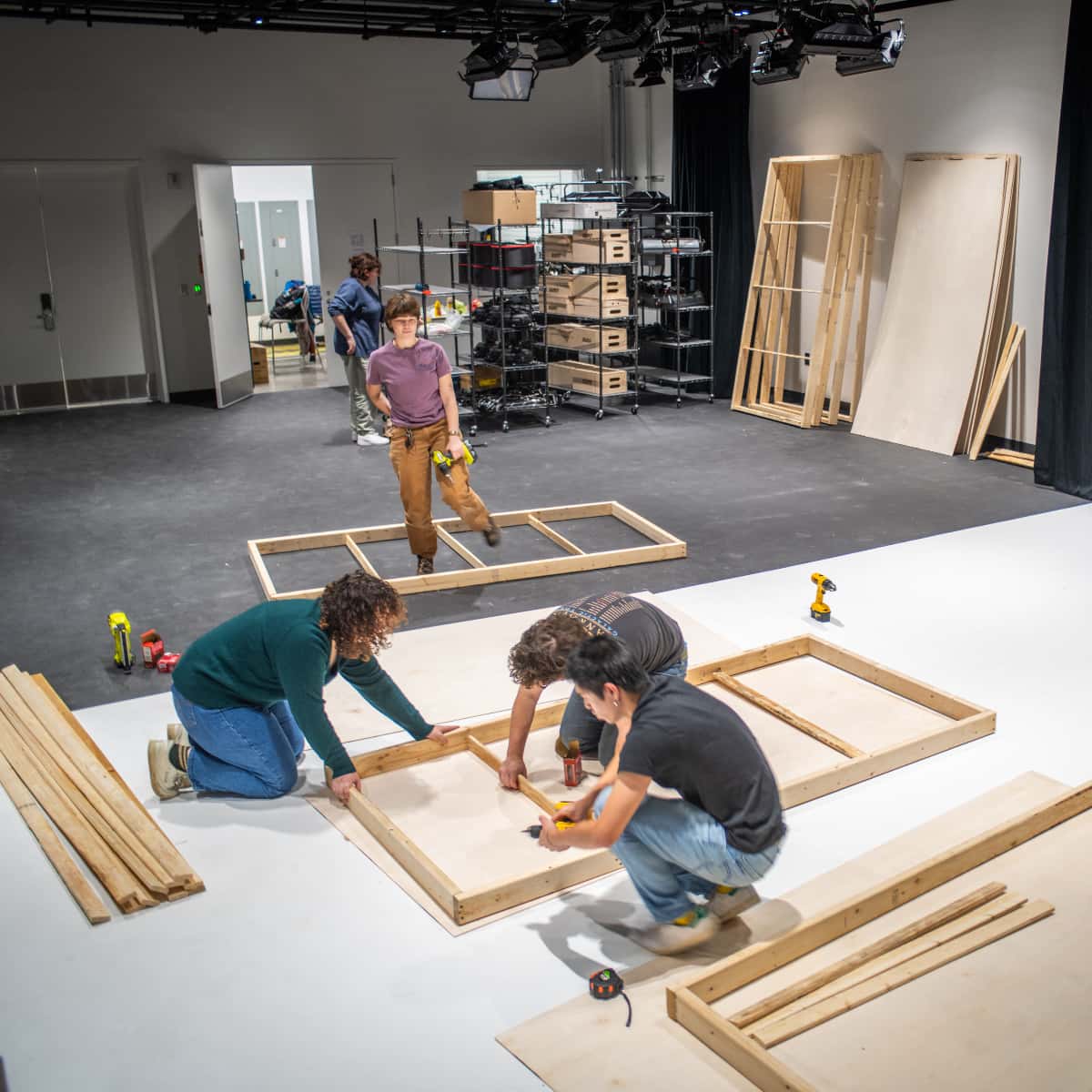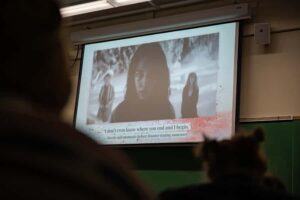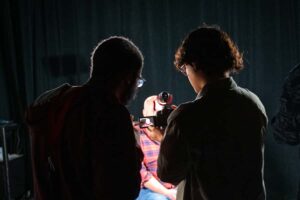Action! That’s the word that best describes the academic life of a screen studies major at Clark. Here, you’ll dive deep into the history, theory, and aesthetics of film, television, and new media. In addition to historical and theoretical studies, you’ll step behind the camera as you learn from hands-on experience how to develop a movie from concept to screenplay to premiere.


Why Study screen studies at Clark?
- Beyond traditional film studies: Clark’s screen studies major incorporates the history and theory of television, along with other new forms of digital media.
- Engage in hands-on, practical, collaborative work in digital video production and make narrative films, experimental films, and/or documentaries.
- Gain experience as an intern at a media organization in New England, New York, or California.
- Create and collaborate with other majors in Clark’s Visual and Performing Arts Department (V&PA), including students majoring in art history; media, culture, and the arts; music; screen studies; studio art; and theatre arts.
- Apply
- Request Info
Are you ready to take the first step?
Featured Courses

Film Genre
Study horror film within larger historical, socio-cultural, and theoretical contexts. Special focus is given to the role of women both in front of and behind the camera.

Intro to Screenwriting
Beats, arcs, setting, characterization, and three-act structure. Learn the principles of screenwriting—both for Hollywood and indie film—by writing a screenplay of your own.

Critical Perspectives on Television
Use various analytical approaches to examine the implications of television as a form of social communication, and develop an understanding of the ideological and structural dynamics that constitute popular culture.
Thirteen courses are required to complete the major. You will enroll primarily in courses on the history, theory, and criticism of film, television, and other forms of motion picture media, as well as courses on screenwriting and video production. In addition to four foundation courses, two 100-level courses — in U.S. film history, international film history — are required. You will also take four advanced level courses of your choice from Screen Studies, one advanced-level film-making course, and one course in a creative medium from a different Visual and Performing Arts program. A capstone seminar or successful completion of an honors thesis completes your program.
At Clark you’ll get more than a great education; you’ll also be prepared for a long, productive career and life of consequence. And once you’ve completed your degree, you can join other Clark alumni who have gone on to work for great organizations and attend some of the best graduate schools in the world. The following communities may be of interest:
Arts, Media, Design, and Communications
Business, Marketing, and Entrepreneurship
Associate Producer of Digital Content
The Metropolitan Museum of Art
Assistant Editor
Technicolor-PostWorks, N.Y.
Senior Compositor
Light of Day Production and Visual Effects
President
Silvatar Media
Producer/Director
Leopard Films USA
The Clark Experience
The Clark Experience brings together the exceptional education you’ll receive in the classroom and so much more. Through focus and flexibility, it ensures you’ll leave Clark with the creativity, confidence, and resilience to succeed and lead a life of meaning and consequence.
Frequently Asked Questions
What can I do with a major in screen studies?
At Clark you’ll get more than a great education; you’ll also be prepared for a long, productive career and life of consequence. And once you’ve completed your degree, you can join other Clark alumni who have gone on to work for great organizations and attend some of the best graduate schools in the world.
What skills will I learn?
- Close analysis of a full range of moving-image forms
- Historical writing
- Theoretical writing
- Ideological critique
- Filmmaking (including sound, lighting, editing, set design, etc.)
- Screenwriting (including the writing and revision of a 100-page, feature-length screenplay)
- Interdisciplinary collaboration (at all levels, but especially in advanced production courses)
What facilities are available?
Based in the Traina Center for the Arts, the screen studies program funds and maintains the Fuller Resource Library, home to the program’s extensive media collection which includes films on DVD and Blu-ray, archival 16mm and VHS items, and a digital repository of past student work. All collection material is available to view in the library, at either an individual media station or the group screening room.
Adjacent to the Traina center is Razzo Hall, a 194-seat recital hall/movie theater.
Can I earn an academic achievement award in screen studies?
Jason Michael Simpkins Memorial Endowment for Screen Studies
The Jason Michael Simpkins Memorial Endowment for Screen Studies was established by Larry J. and Michelle Simpkins in memory of their son, Jason Michael Simpkins, a member of the class of 2005. The award is to assist undergraduate students with the expenses incurred in completion of a film and/or a piece of written research. The recipients should possess high academic ability in screen studies and exceptional character, with an intention to pursue a career or higher education in screen studies.
Patricia M. Plamondon Undergraduate Award in Visual and Performing Arts
The Patricia M. Plamondon Award is given to juniors and seniors who have demonstrated their talent in and commitment to the arts and for whom the award will serve to enhance their studies, research, or project-related travel. The award is made annually by a vote of the full-time faculty of the Department of Visual and Performing Arts.
Is there a screen studies honors program?
During the junior year, with program approval, students may pursue honors in screen studies. An honors project entails working closely with a professor to develop a thesis on a topic of your choice. Recent honors theses topics include the following:
- Raised on Promises: An Investigation of the American Coming-of-Age Film
- “Rat Girls,” a four-episode teleplay for an animated series
- Postmodern Pleasures: Bollywood’s Relevance in the Global Age
- “westing,” a student-created experimental documentary film
- Overcoming Sorrow: The Struggle of Peruvian Cinema and Its Promise of Progress in Claudia Llosa’s ‘The Milk of Sorrow’
Be a force for change.
Come study at a small research university with a strong liberal arts core.

